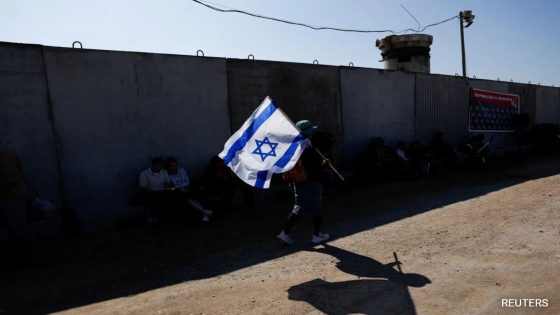Tsav 9, also spelled Tzav 9, emerged in January this year.
New Delhi:
The US imposed sanctions on the far-right Israeli group Tsav 9 today in response to the group’s aggressive actions against humanitarian aid convoys destined for Gaza. These measures, enacted under an executive order signed by US President Joe Biden in February, are aimed at addressing violence and threats to stability in the West Bank.
The US State Department has levied sanctions against the group described as a “violent, extremist Israeli group,” for obstructing convoys delivering humanitarian aid to Gaza and for assaulting trucks. According to the State Department, Tsav 9 members started blocking the crucial Kerem Shalom crossing near the Gaza-Israel-Egypt border at the beginning of the year. They subsequently set fire to trucks and injured drivers and Israel Defense Forces soldiers, exacerbating the hunger crisis within Gaza.
What Is Tsav 9?
Tsav 9, also spelled Tzav 9, emerged in January this year. The group’s name references “Tzav-8,” the emergency call-up order for Israeli military reservists. It was formed by Israeli settlers, army reservists, and families of those taken hostage by Hamas during the October 7 attacks last year. These individuals oppose the delivery of humanitarian aid to Gaza, believing that much of the aid is diverted to Hamas.
Since its formation, Tsav 9 has been implicated in numerous violent activities aimed at disrupting aid shipments to Gaza. The group’s tactics include blockading roads, harassing drivers, and vandalising trucks. They have attacked convoys at the Kerem Shalom crossing, setting trucks on fire, and injuring both drivers and Israeli Defense Forces (IDF) soldiers.

Photo Credit: Reuters
In May, Tsav 9 members looted and burned two aid trucks near Hebron, an act that was part of a broader campaign to prevent essential supplies from reaching Gaza. Footage has surfaced showing the group ransacking aid shipments, dumping food and medical supplies onto the road. These actions have contributed to the worsening humanitarian crisis in Gaza, where famine conditions have been reported.
International and Domestic Reactions
US National Security Adviser Jake Sullivan labelled the attacks as “utterly unacceptable,” while Aaron Forsberg, the director of the State Department’s Office of Sanctions Policy and Implementation, reiterated the US commitment to using all available tools to hold perpetrators accountable.
“We’re using the authority to sanction an ever-broadening selection of actors, targeting individuals and entities that threaten the peace, security and stability of the West Bank regardless of religion, ethnicity or location,” Aaron Forsberg said, as quoted by news agency Reuters.
Inside Israel, the response to Tsav 9 is mixed. While the group’s actions have sparked international outrage, there is significant domestic support for their opposition to aid shipments to Gaza. Several polls indicate that a majority of Israelis favour limiting or halting humanitarian aid to Gaza.
Tsav 9’s activities are part of a larger pattern of settler violence in the region. Palestinians and human rights organisations have long accused the Israeli military and police of failing to adequately intervene in settler attacks. The recent wave of violence has escalated since the conflict between Israel and Hamas intensified on October 7, 2023.
The Israeli government has faced criticism for its handling of the situation. Its National Security Minister Itamar Ben Gvir has been accused of adopting a lenient approach towards settler violence, while some Israeli security forces are believed to be complicit in tipping off Tsav 9 activists about the locations of aid convoys.
Source Agencies


